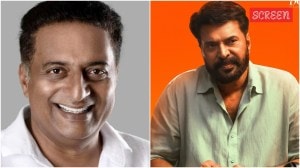The Kyrgyz kid under an oversize kolpak and other mind games
Little masters match wits at international U-5 chess tourney
A few moves into the match,Artur Solomko of Kyrgyztan is clearly out-psyching his opponent. He makes his move,then fixes Vallabh Kavi with an unblinking gaze. He captures a piece,then tauntingly uses it to click the electronic timer.
Solomko could be a veteran of many chessboard battles,a seasoned master grandmaster even of the mind game. Fact is,he is only four.
The Kyrgyz kid under an oversize kolpak hat has won six of his eight matches so far. At the under-5 category of the 7th Asian School Chess Championship currently under way at Delhis Indira Gandhi Indoor Stadium,he is the player to beat.
This juniormost of age-group chess competitions is being held for the first time in India. Forty-eight children from Malaysia,Iran and the UAE besides India are in the fray. Hunched forward in their chairs,feet dangling a fair way above the floor,they stare intently at the chessboard on the table in front. In the unsure scrawl of the new learner of the alphabet,they jot down their moves on a sheet of paper.
From the spectators gallery,parents and coaches watch. Solomkos coach Baktygul Tilenbaeva has represented Kyrgyztan at the Asian games. Coaching a four-year-old is no childs play,declares the matronly 51-year-old.
The advantage is that since they have just started the game,there is a lot of curiosity about how it works. But it is difficult at the same time because the curiosity isnt limited to the chess. Artur wants to run,jump,play, she says.
Ihsan Jawed,whose young ward from the UAE is competing,says all the coach can do is teach the basics.
It is hard to make them focus for too long,so you teach them how to open up the game so they are able to kill pieces easily.
Ultimately that is what the children want to do.
And then,he says,you pray that they dont get distracted. It isnt good for my heart or blood pressure.
Bharat Chauhan,secretary of the All India Chess Federation,agrees that U-5 might indeed be a bit too young for competition but says the Asian Chess Federation has made it mandatory to hold matches in that category.
Its fun to watch,though,he says and not just because the players are so cute. Children play instinctively and freely. Games hardly ever end in draws and so it is more attractive.
Fearless and unencumbered the players might be,but theyre no less competitive for that reason.
It is far more difficult to watch over these children than players in any other category. You need to put up with tantrums,and a few of these children are smart enough to know how to get things in their favour so you cant be fooled by tears either, says K Gopakumar,an official.
Like in most competitive situations though,the real aggression comes from the parents.
Are you calling my baby a liar? yells one enraged mother who is upset that her daughter has lost,and has promptly accused her opponent of cheating. As the children all around her try to concentrate on their games and worried-looking officials shush her collectively,the daughter in question has wandered off happily to play a game of pattycake with the rival who has just defeated her.
Amidst the innocence,there is some ugliness too. Rishab Anand of Orissa pulled out of the tournament citing a fever,but suspiciously,the withdrawal came only after he was scheduled to take an age verification test after a few parents raised objections. The parents argued that Rishabs ability to focus on the chessboard was very un-five-year-old-like this capability comes only by age seven or eight.
If that is true,it must also mean that young Artur Solomko is blessed with an ability beyond his four years. After 36 moves,he has his opponent trapped. Mate, he says dismissively.
Moments later,he has forgotten the achievement as he races up and down the spectator column shrieking in delight as he chases an older Kyrgyz teammate from the u-7 category. He pauses for a moment when his coach asks him to tell a curious Indian parent who his favourite player is. For a moment,Solomko appears confused. And then replies,Dasha-sledopyt (Dora the Explorer).



- 01
- 02
- 03
- 04
- 05




























